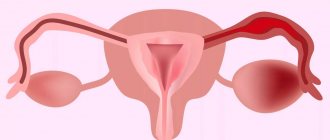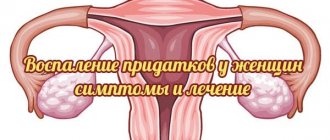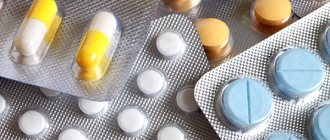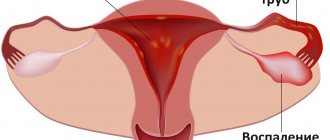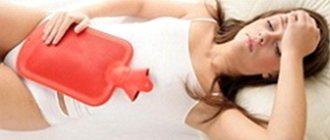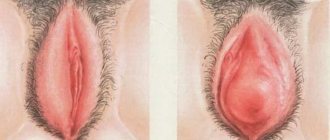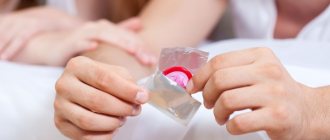Antibiotics for adnexitis, an effective way to treat inflammation of the ovaries and fallopian tubes. Another name for the inflammatory process that develops in the uterine appendages is salpingoophoritis. This pathology is one of the most common gynecological diseases among patients aged 20-30 years.
Why is adnexitis dangerous?
Adnexitis, or salpingoophoritis, is an infectious inflammatory disease that damages the uterine appendages - fallopian tubes and ovaries. It is caused by various pathogenic microorganisms:
- Streptococci.
- Staphylococci.
- Escherichia coli.
- Candida fungi.
- Chlamydia.
- Anaerobic pathogens: clostridia, peptostreptococcus.
- Urea - and mycoplasma.
- Gonococcus.
- Diphtheria corynebacterium.
- Tuberculosis bacillus.
Infection enters the appendages in two ways. In the first case, bacteria enter the tubes and ovaries from infectious foci within the body through the blood and lymphatic system (descending route of infection). In the second - through the lower parts of the reproductive system during abortion and curettage, insertion of an IUD, sex without a condom, non-compliance with personal hygiene rules.
Important! Acute adnexitis has a clear clinical picture: severe pain in the inguinal and iliac areas, fever, dysuria and constipation, purulent discharge from the genital tract.
The chronic form of salpingoophoritis is characterized by less pronounced symptoms, but under unfavorable conditions the disease can worsen.
Treatment of salpingoophoritis should not be delayed due to the serious complications inherent in the disease. Acute adnexitis can provoke inflammation of the peritoneum (peritonitis), suppurative processes in the appendages and sepsis. These conditions are life-threatening and require urgent surgical intervention. Chronic salpingoophoritis is often complicated by an adhesive process, leading to closure of the lumen of the tubes, as well as disruption of the functioning of the ovaries. This is the cause of tubal-ovarian infertility.
Traditional medicine knows how to cope with adnexitis
The causes of ovarian inflammation are provoking factors and diseases of organs and systems. The most common is an infection that ascends from the vagina to the uterus, then through the fallopian tubes to the ovaries. Bacteria that cause inflammation of the ovaries, chlamydia, E. coli, streptococci, staphylococci, yeast fungi thrive in the warm and moist environment of a woman’s internal organs, weakened by various factors.
Causes of inflammation of the appendages, symptoms
Adnexitis is promoted by such situations that weaken the immune system:
- hypothermia;
- overwork;
- stress;
- pregnancy;
- termination of pregnancy (abortion):
- premature birth;
- postpartum complications;
- curettage of the uterine cavity;
- installation of an intrauterine device;
- lack of hygiene;
- gynecological operations;
- sexual intercourse during menstruation.
Adnexitis can occur against the background of inflammatory focal diseases of the sinuses, tonsils, and teeth. Infectious diseases can also cause inflammation:
- tuberculosis;
- angina pectoris;
- peritonitis (inflammation of the intestines);
- acute appendicitis;
- Crohn's disease;
- sigmoid diverticulosis.
To prevent inflammation of the appendages from passing into the chronic stage, it is necessary to begin its urgent treatment. After all, the chronic form is difficult to cure and will require a fairly long period. Until the disease recedes, planning a pregnancy is dangerous for both the mother and the fetus.
Risk factors
However, many inhabitants of the Earth, even knowing about the natural purpose of women, do not take care of their health, have bad habits and promiscuous sex, often become hypothermic, and do not observe the rules of personal hygiene. It is because of this lifestyle that they can develop various diseases of the reproductive system organs located in the pelvic cavity. In women, they are less protected, and therefore much more often than in men, they are attacked by all kinds of infectious agents. This is how endometritis and inflammation develop
and the gonads themselves, the vagina, the cervix. Other risk factors for women are promiscuity, long-term use of intrauterine contraceptives, frequent curettage (abortion), and unprofessional medical manipulation of the genitals.
The anatomical structure of the male reproductive system is such that the penetration of infection into their genital tract occurs much less frequently and more difficult. However, under a combination of unfavorable conditions (immunodeficiency, prolonged hypothermia), inflammation of the epididymis in men can develop.
How to use candles
There are rules for the administration of rectal and vaginal suppositories. To achieve a positive effect, you must follow them exactly.
- The suppository should be administered only after personal hygiene and only with clean hands. If the suppositories are rectal, then use an empty bowel.
- Administer the drug in a supine position. Insert vaginal ones while lying on your back, and rectal ones - on the barrel. After administration, lie down for at least 30 minutes.
- During treatment, refrain from sexual contact and observe increased hygiene measures.
How drugs are selected
If characteristic symptoms occur, the patient is admitted to a hospital for treatment of adnexitis with antibiotics. This is the first stage of therapy and in case of uncomplicated course of the disease, these drugs help to achieve complete recovery.
Before selecting a treatment regimen for adnexitis, the type of pathogen and its sensitivity to antibacterial drugs are determined. For culture, smears are taken from the cervical canal and puncture from the posterior vaginal fornix. If it is not possible to carry out a culture or the patient is in a serious condition requiring urgent treatment, combinations of antibiotics are prescribed that destroy the most common pathogens of adnexitis.
Treatment of acute oophoritis
The doctor prescribes treatment only after a full examination. Treatment of acute oophoritis is carried out only in a hospital in the presence of high temperature. The process is accompanied by the use of antibiotics, immunostimulants, vitamins, vaginal suppositories, antibacterial, antihistamines, painkillers, antifungal drugs and hormonal agents.
The use of the latter is aimed at restoring the normal menstrual cycle. If the disease is in the subacute stage, then physiotherapy may be used.
It is important to note that in no case should acute oophoritis be treated independently with folk remedies without prior consultation with a doctor, since such an attitude towards one’s health is fraught with infertility
Release forms
Depending on the patient’s condition when treating inflammatory diseases of the appendages with Metronidazole, the doctor selects an appropriate treatment regimen.
The drug is available in various forms, allowing you to use each product alone or together with others. The main substance of each of the following drugs is metronidazole.
Forms of release of Metronidazole | Application | Note |
| Gel | Local application | Local therapy is indicated as part of a set of measures for significant discharge and discomfort in the external genital area. |
| Candles | Intravaginal administration | |
| Pills | Oral administration | Prescribed most often, the dosage is selected individually taking into account age, health status, use of other medications and the severity of the disease. |
| Solution | For IVs | Used in hospital settings. |
When asked whether it is possible to combine several forms of the drug during treatment, doctors answer in the affirmative. For recovery, the medicine must be used in a course, which is not advisable to interrupt.
If the drug has not been ingested the required number of times, pathogens may develop resistance to the main active ingredient. And in the future, medications containing this active substance will no longer work.
In some cases, instead of Metronidazole, its analogues may be prescribed, which are:
- Metrogil;
- Klion;
- Trichopolum and others.
For your information! In addition to Metronidazole, other antibiotics are used to treat adnexitis. These include Azithromycin and Doxycycline.
Causes of thrush
Why thrush occurs is one of the most common questions among women. After all, this problem is very common. Unpleasant sensations arise at the most inopportune moment. This fungal disease destroys intimate relationships and ruins everyday life. You can become infected with candidiasis from a sexual partner. Especially if a man has obvious signs of this disease or is a carrier of fungi. However, this reason is far from the most common. Much more often, thrush occurs as a consequence of decreased immunity and disruption of the natural balance of the microflora of the genital organs. There are many factors that provoke the development of vaginal candidiasis in women.
- A decrease in the body's defenses as a result of chronic diseases or after infections.
- Hormonal changes during pregnancy and before menstruation.
- Changes in hormonal levels during menopause.
- Use of hormonal contraceptives.
- Long-term use of antibiotics, corticosteroids and cytostatic drugs.
- Intestinal dysbiosis, in which fungi can be introduced into the vagina.
- Climate change, which entails adaptation to new conditions and water composition.
- Use of intimate hygiene products: intimate gels, soaps, shower gels containing a lot of alkali and fragrances.
- Using panty liners. They interfere with air access to the genitals, increasing humidity.
- Deodorized tampons and pads cause allergic reactions and disrupt the condition of the mucous membrane.
- Wearing underwear made of synthetic fabrics, narrow and tight. The most common culprit for thrush is thongs.
- The diet is rich in confectionery and carbohydrate dishes, strong coffee, carbonated drinks, yeast baked goods, spicy and fatty delicacies, ketchup and mayonnaise.
- Vitamin deficiency entails a decrease in the body's resistance and a deterioration in the condition of the skin and mucous membranes.
- Obesity - favorable conditions for the proliferation of fungi are created in the folds of the body.
- Metabolic disorders. A striking example is diabetes mellitus. It not only weakens local immunity, but also increases the amount of carbohydrates in cells, which is a good breeding ground for microorganisms.
- Smoking causes vasospasm and impairs blood circulation, including in the genitals.
- Sexual intercourse with a dry vagina and other actions that can lead to microtraumas on the genital mucosa. Through them, Candida can penetrate deep into the tissues.
- Chronic stress, severe mental and physical stress, overwork, lack of sleep.
The action of these factors leads to a decrease in the number of lactobacilli that create a protective microfilm. They produce less lactic acid, and an alkaline environment is formed in the vagina. Fungi and other bacteria penetrate the cells of the mucous membrane and thin skin of the external genitalia. There they begin to actively reproduce, feeding on glycogen and destroying host cells. If left untreated, the inflammatory process gradually spreads.
Antibiotic treatment approach
Before prescribing medications, the patient is asked about the presence of allergic reactions, diseases for which the use of antibiotics is contraindicated are identified.
For pregnant and lactating women with adnexitis, the treatment regimen and type of drugs change.
Drug antibacterial therapy is carried out according to the instructions described for the drugs. The duration of treatment should be at least 7-10 days. The drugs are prescribed intravenously to achieve a quick effect. If there are no results from treating adnexitis with antibiotics within 2 days, the issue of surgical treatment is decided.
How to choose the right candles?
The main thing to remember in this case is that suppositories are selected exclusively by the doctor, based on the examination and test results. It is very dangerous to self-medicate with this disease. Especially in the acute stage of adnexitis. What will the doctor rely on when deciding which suppositories to prescribe?
First of all, the pathogen that led to the inflammation is determined. It can be:
- gonococci;
- ureaplasma;
- chlamydia;
- Trichomonas;
- mycoplasma.
After identifying the pathogen, antimicrobial drugs are prescribed. Sometimes suppositories are prescribed in combination with tablets. In other cases, only these will be enough.
Secondly, when prescribing suppositories, the doctor will pay attention to what additional symptoms bother the woman. Is there any itching, pain, what kind of discharge, is the body temperature elevated? It is very important to consider whether the patient is pregnant or breastfeeding. Only after taking into account all the above factors, the woman is given a prescription with the desired name of suppositories and an individual dosage regimen.
Why does the disease occur?
Adnexitis is a pathological change in the microflora of a woman’s internal genital organs. If you do not start treatment on time, this may lead to the fact that in the future the carrier of this disease will be deprived of the opportunity to become pregnant, bear and give birth to a child. Antibiotics for adnexitis are the most effective drugs.
An interesting fact is that not entirely healthy women are affected by this disease. If immunity is reduced, the body is weakened, then this is one of the main causes of pathology.
What is the disease? What is adnexitis? This is a pathology in which infections such as streptococcus, tubercle bacilli, gonococcus, fungus or E. coli enter the internal genital organs.
Only such an aggressive organism as gonococcus can penetrate inside; all other infectious pathogens can enter there only if malfunctions in the functioning of the woman’s body are detected.
Hexicon helps with inflammation
Women discuss gynecological problems with great reluctance and some shyness.
This is not surprising, because such pathologies (usually inflammation) do not bring anything good to the owner. However, under no circumstances should they be launched. And at the first unpleasant symptoms you should consult a doctor. Modern pharmacology has developed excellent medications that can effectively treat any female disease. Suppositories for inflammation in gynecology are especially popular.
They are also called suppositories.
Features and types of candles
For almost all female diseases, suppositories are included in complex therapy. Suppositories for the treatment of inflammation in gynecology are formed from the main active ingredient and a special base.
A characteristic feature of medications in this dosage form is the ability to retain its shape in the cold. But after entering the body, they quickly melt and turn into a liquid state.
Suppositories used in gynecology are divided into:
- medications for rectal administration - they enter the body through the rectum;
- medications for vaginal administration - the necessary substances enter the vagina;
- means in the form of a stick - they are injected into the ureter or uterine cervix.
For pathologies, any drugs can be used. But the most popular are vaginal suppositories for inflammation in gynecology.
Main advantages of suppositories
Vaginal suppositories help effectively get rid of many unpleasant symptoms. They differ in local impact.
It has been noted that it is anti-inflammatory suppositories in gynecology that effectively eliminate the clinical manifestations of various pathologies (redness, itching, swelling, discomfort).
For inflammation, medications in this dosage form are considered the best drugs.
After all, candles have the following advantages:
- Suppositories act directly on the inflammatory focus. Undoubtedly, the big advantage of suppositories is that they do not enter the stomach and do not affect the liver. Such medications immediately affect the vaginal mucosa.
- The substance needed for treatment enters the blood very quickly (in approximately 30-60 minutes).
- When using suppositories, the risk of serious allergic reactions is minimized.
What should you know?
Despite the excellent characteristics, suppositories for inflammation in gynecology cannot be used independently. It is very important to discuss the use of such drugs with your doctor. This is especially true for women who suffer from systemic pathologies, hypertension, diabetes, and thyroid diseases.
For example, the excellent drug Betadine, which is a powerful antiseptic and can get rid of many microbes, contains iodine. For patients diagnosed with thyroid diseases, this remedy can seriously harm.
Therefore, before using any candles, read their instructions very carefully. It’s best to go to an appointment with a gynecologist. In this case, the therapy will be completely safe and at the same time most effective.
Popular drugs
For inflammation of the appendages, suppositories are part of complex therapy. They effectively eliminate pain, relieve inflammation and help improve immunity. Their effect on the body can be compared to an injection. Indeed, in both cases, the active substance is very quickly absorbed into the blood.
At the same time, only the doctor decides which suppositories to use for inflammation of the appendages in gynecology. His choice is based on the examination of the patient. However, a woman should know what drugs are produced by modern pharmacology. Therefore, we will analyze the most popular suppositories for inflammation in gynecology.
Names of popular and effective suppositories:
- "Betadine";
- "Terzhinan";
- "Klioni Arilin";
- "Dalacin";
- "Bifonorm";
- "Lactonorm";
- "Gaynomax";
- "Polygynax";
- candles with belladonna;
- "Phythoraxin";
- "Fluomizin";
- indomethacin suppositories;
- "Hexicon";
- "Pimafucin";
- "Movalis";
- "Diclofenac".
Let's look at some of them.
The drug "Diclofenac"
Such suppositories contain non-steroidal agents. In gynecology, Diclofenac suppositories are often prescribed. But sometimes suppositories may be recommended: Voltaren, Indomethacin. The medication "Diclofenac" is used rectally.
It perfectly reduces pain and eliminates the inflammatory process. In addition, the medicine helps normalize the temperature and destroy the infection. As a rule, the patient is prescribed 1 suppository at night.
This drug is contraindicated for use in:
- stomach ulcer;
- hemorrhoids;
- intestinal erosions;
- pregnancy (first trimester);
- hematopoiesis disorder.
Medicine "Polygynax"
These are vaginal suppositories. This drug contains two antibiotics: polymyxin and neomycin. In addition to these ingredients, they also contain nystatin, an antifungal substance.
Suppositories effectively help eliminate many pathogenic microorganisms (streptococci, E. coli, ureaplasma). In addition, they are used in the treatment of fungal diseases.
They perfectly treat many pathologies, including inflammation of the ovaries. Suppositories in gynecology are used to combat vaginitis, colpitis, and vulvovaginitis.
Often this drug is used as a prophylactic agent before upcoming operations, childbirth, and diagnostic procedures.
Suppositories are prescribed for medicinal purposes, usually for 12 days, 1 suppository at night. If the product is used for prophylaxis, the course is reduced to 6 days.
The drug "Polygynax" is well tolerated by the body. It has a minimal number of side effects, so it extremely rarely provokes their occurrence. Basically, these can be allergic manifestations.
Such suppositories should be used with great caution by women who cannot tolerate soybean oil and peanuts.
With long-term therapy (this is often observed when using the drug independently), microflora disturbances may occur.
Source: https://za-dolgoletie.ru/info/geksikon-pomogaet-pri-vospalenii/
The most popular products
Antibacterial tablets for adnexitis are prescribed according to clinical protocols and recommendations. The most effective are those groups of antibiotics that have a wide range of action. They have the most powerful effect on foci of infection of various nature in the appendages, allowing adnexitis to be treated quickly and without complications.
Ceftriaxone
Ceftriaxone for adnexitis is the most prescribed antibiotic. It belongs to the group of third generation cephalosporins.
Effectively fights the following pathogens that can cause adnexitis:
- Staphylococcus aureus.
- Various types of streptococcus.
- Intestinal gram-negative bacteria: Escherichia coli, Enterobacter.
- The causative agent of gonorrhea.
- Pathogenic anaerobes.
Ceftriaxone is prescribed intramuscularly or intravenously in a single dose of 500 mg 2 times a day. Together with it, doxycycline and metronidazole are used in combination to increase activity against anaerobic pathogens of salpingoophoritis. The course of treatment is 2 weeks.
The use of ceftiaxone for the treatment of adnexitis with antibiotics is contraindicated in women suffering from hepatic-renal failure, as well as during the first trimester of pregnancy and lactation.
Doxycycline
One of the most effective antibiotics for adnexitis is doxycycline. This is a drug from the tetracycline group. The antibiotic has a pronounced bactericidal effect on intestinal bacteria (Escherichia coli, Shigella, Enterobacter), chlamydia, myco- and ureaplasma.
Doxycycline is combined with antibiotics that act on anaerobic flora. It is also indicated for allergies to lactam drugs (penicillins, cephalosporins). It is prohibited to use in the treatment of pregnant women, as well as in patients with liver failure.
Augmentin
Augmentin is the original name of the drug containing amoxicillin and clavulonic acid.
It is used to treat inflammation of the uterine appendages caused by staphylococcal, streptococcal infections, E. coli and gonococcus. Safe for pregnant women at any stage of gestation.
Contraindicated in case of allergy to penicillins and liver failure.
To treat chlamydial infection that causes salpingoophoritis, Augmentin is prescribed together with doxycycline or macrolides.
Ciprofloxacin
The second generation fluoroquinolone ciprofloxacin is used to treat adnexitis caused by intestinal bacteria, chlamydia and streptococcus. Can be used in the form of tablets or intravenous infusions 2 times a day for 7-14 days.
Tsiprolet is contraindicated during pregnancy, renal and hepatic failure, and cerebrovascular accident. Allergic reactions may develop.
Metronidazole
Metronidazole is an antibacterial and antiprotozoal drug that is included in treatment regimens for adnexitis in combination with doxycycline or clarithromycin. It effectively copes with Trichomonas, anaerobic and gram-positive infections.
It is prescribed orally at 400 mg for 2 weeks.
Absolutely contraindicated in the first trimester of pregnancy; in later stages it is used under the supervision of a doctor for severe adnexitis.
Azithromycin
Representative of the group of macrolide antibiotics. The original name is Sumamed. Azithromycin for adnexitis is used to destroy streptococcal, gonorrheal and chlamydial infections, mycoplasmas and anaerobes.
Sumamed for adnexitis is prescribed intravenously or in tablet form. Can be used during pregnancy under medical supervision.
Gentamicin
Gentamicin is an aminoglycoside antibacterial drug. Its action is aimed at intestinal gram-negative microorganisms, and in combination with clindamycin or ceftriaxone it effectively copes with staphylococcal, streptococcal and anaerobic infections.
It is prescribed intravenously at a daily dose of 5 mg/kg body weight, divided into two doses. Gentamicin is believed to cause fetal malformations and is therefore prohibited for use in pregnant women. It is also contraindicated in cases of renal impairment.
Pills
Very often, inflammatory processes are accompanied by pain in the lower abdomen.
To reduce them, various means are used:
- Nurofen. The active ingredient is ibuprofen. The medicine belongs to the group of non-steroidal anti-inflammatory drugs. The daily dosage of the medication is 1200 mg, which is divided into several doses. Very often, when using this remedy, gastrointestinal upset, shortness of breath, heart rhythm disturbances, etc. occur. If used for too long, the product may contribute to the occurrence of gastrointestinal erosions. The drug is not recommended for use in case of hypersensitivity to the main substance, various blood pathologies, hypertension, etc.
- Diclofenac. The active ingredient is diclofenac sodium. Reduces inflammation and pain, and also reduces temperature in the affected area. You should not use the medication for peptic ulcers, gastrointestinal bleeding, aspirin-induced asthma, etc. In addition, it is worth limiting consumption in case of heart disease, kidney and liver failure, various intestinal pathologies, diabetes mellitus, etc. The standard daily dosage of Diclofenac is 200 mg divided into several doses. After consumption, constipation, bloating, dizziness, various allergic reactions and much more may occur.
- Nise. The active component is nimesulide. This drug belongs to the group of NSAIDs. The medication has an anti-inflammatory, analgesic and antipyretic effect. The maximum daily dose for adults is 200 mg, divided into several doses. Side effects: diarrhea, nausea and vomiting, abdominal pain, allergic reactions, etc. Contraindications include individual intolerance to the active component, gastric bleeding, inflammatory bowel pathologies, hemophilia, etc.
In addition to painkillers, antihistamines are used:
- Suprastin
- Zyrtec
- Tavegil
- Fenistil
- Diazolin
- Claritin
In especially severe cases, for example, with inflammation of the appendages, glucocorticoids are prescribed:
- Betamethasone. The active substance is betamethasone. The medication has anti-inflammatory, anti-edematous, anti-allergic and antipruritic effects. The drug is not recommended for use in case of hypersensitivity to the main component, immunodeficiency conditions, gastrointestinal pathologies, cardiovascular diseases, renal and liver failure. Negative manifestations include sleep disturbance, dizziness, pain in the head, weight gain, allergic reactions and much more.
- Prednisolone. The active ingredient is prednisolone. The product has anti-inflammatory, antiallergic, immunosuppressive effects. Contraindications include: hypersensitivity to the active component, immunodeficiency states, pathologies of the gastrointestinal tract and cardiovascular system, endocrine disorders, severe renal and liver failure. Side effects: nausea, vomiting, menstrual irregularities, headache, increased intracranial pressure, etc.
https://youtube.com/watch?v=BMRCfOBRPnI
To increase the body's defenses, the following are prescribed:
- Polyoxidonium
- Cycloferon
- Lycopid
Remember that any remedy, even the safest one, causes negative manifestations, so you should not self-medicate. At the first signs of inflammation, contact a medical facility.
Features of antibiotic treatment
When prescribing antibiotics for the treatment of adnexitis, the following rules should be followed:
- Prevention of dysbiosis. Long-term use of antibacterial drugs provokes a decrease in the number of beneficial bacteria inhabiting the intestines and vagina. Eubiotics (Bifidumbacterin, Acylact, Lactobacterin) should be prescribed together with antibiotics to prevent dysbacteriosis.
- A full course of therapy. Even if the patient's condition improves, the patient should continue to take antibiotics until the full course is completed. Short courses of drugs will not bring a cure and may provoke the development of bacterial resistance to antibiotics.
- Additional types of treatment. In addition to antibiotics, infusion therapy is prescribed for the treatment of acute and exacerbations of chronic adnexitis. These are special solutions for intravenous infusion that allow you to speed up the removal of toxins from the body. For severe pain, non-steroidal anti-inflammatory drugs (Diclofenac, Indomethacin) are used. Physiotherapy is used to treat chronic adnexitis. Magnetic therapy, UHF on the groin area, as well as electrophoresis with zinc are used.
- Surgical intervention if there is no effect. If, 48 hours after the start of antibiotic therapy, the patient’s condition with adnexitis has not improved, peritonitis and a septic condition begin to develop, urgent surgery is required.
Causes
St. John's wort,
After the acute manifestations of the symptoms of the disease begin to disappear, it is imperative to add physiotherapeutic procedures to the course - ultrasound, treatment with magnetic alternating and diadynamic current. All this will significantly reduce the risk of formation of adhesions and will complement the use of antibiotics, enhancing their effect.
complaints about deterioration of the general condition of the body;
Attempts to become pregnant will be completely futile if the fallopian tube is blocked or partially patent. The egg simply cannot enter the uterine cavity and properly penetrate the endometrium. The prognosis is especially serious and unfavorable if there is bilateral damage to the uterine appendages.
eucalyptus.
Chamomile
In the treatment of chronic adnexitis, the widespread use of physiotherapeutic procedures helps to reduce the activity of the inflammatory process, such as:
Take the required amount of dried boron uterus in the proportion of 1 tablespoon to 1 glass of water, fill it with boiled purified water at a temperature of no more than 80 degrees and let stand for about 20 minutes. Drink the tincture an hour before meals three times a day, a quarter glass, for no more than two months of continuous cycle.
chronic bilateral salpingoophoritis.
The analgesic component includes the prescription of non-steroidal anti-inflammatory drugs: ibuprofen, diclofenac, meloxicam. Local dosed hypothermia has a positive effect: hardware or ice for 10 minutes three times a day.
sanatorium regime (exclusion of everyday working and living conditions, tranquility, rational nutrition);
Adnexitis is a rather dangerous inflammation of the ovaries and fallopian tubes for a woman’s health, causing various complications in the medium term, including infertility, and therefore requires mandatory comprehensive drug treatment.
This plant has hypotensive, expectorant, anti-inflammatory, anticonvulsant, wound-healing, antiseptic and analgesic effects, is widely used in medical practice and is considered almost twice as powerful from a biostimulating point of view as aloe extract.
Nature of distribution
The acute form is expressed in a violent and painful course with clearly expressed symptoms with a sharp rise in temperature.
As planned, during the period of remission, an operation is performed to remove appendages changed by purulent inflammation into sac-like inflammatory tumors. The extent of the operation depends on the patient’s age, the nature and spread of the destructive process, and potential oncological alertness.
myosalpingoophoritis: a rare type of disease - the pathogen penetrates from muscle tissue.
Not the best option for the course of chronic adnexitis is an ectopic pregnancy. It occurs in the case of partial patency of the fallopian tube, when the fertilized egg is implanted into the mucous membrane of the tube, rather than the uterus. As the pregnancy progresses, the tube increases in size and at some point ruptures. In this case, intra-abdominal bleeding and peritonitis (inflammation of the peritoneum) develop.
increase in temperature, sometimes to high numbers; delayed menstruation or cycle failure; observe the rules of intimate hygiene; frequent manifestations of cystitis;
Problems of differential diagnosis
However, if the disease remained latent for a long time or the patient did not take care of her health and independently used antibiotics for inflammation of the appendages, then most often in such cases many complications arise, not only leading to infertility, but also requiring surgical treatment.
Timely diagnosis of diseases of the reproductive function is often extremely problematic, since patients “endure on their feet” for a long time during the initial phase of the disease and consult a doctor only after the appearance of pronounced symptoms.
At this point, the signs of the disease are similar to many other diseases: endometritis, peritonitis, kidney cyst, and therefore the doctor can make a diagnosis only on the basis of a detailed history and examination, laboratory tests (CBC, OAM, PCR, immunological methods RIF and ELISA) and instrumental studies ( Ultrasound).
DETAILS: Antibiotics during pregnancy - administration, effects, what they can
Other methods of treating adnexitis
Treatment of adnexitis with folk remedies gives good results and does not provoke side effects. To soothe the pain, you can lubricate the lower abdomen with warm lard.
It is important to lubricate this area, but not to rub it. Therefore, movements should be soft and careful
It is extremely useful to ingest fresh pumpkin juice and corn cob decoction during home therapy. You should also drink a glass of yogurt every day. This product significantly reduces the inflammatory process.
To cure adnexitis without using potent medications, you need to give yourself steam baths every day. To do this, you can boil the forest village, place it hot in a basin and sit over it for a while. This procedure must be repeated every day until the disease subsides.
Steam from sheep's wool, cabbage boiled in milk, and boiled black radish, which is also sprinkled with olive oil, has similar healing properties. You can prepare a sitz bath. To do this, bay leaf is brewed together with St. John's wort. This water procedure will help with diseases of the ovaries, bladder and uterus.
When the inflammatory process of the appendages develops in the initial stage, then a large spoonful of crushed walnut leaves should be poured with 250 ml of boiling water, let the drink brew for four hours and drink within 24 hours. Additionally, three times a day before meals, you need to drink one teaspoon of juice obtained from aloe leaves.
To get rid of unpleasant symptoms and eliminate the discomfort that appears with inflammation of the appendages, you can use the most effective traditional methods of treatment. One of them is lotions prepared from a decoction of the root of bodanum thickifolia. A small rhizome needs to be crushed and pour 200 ml of boiling water, cover the liquid with a lid and leave for an hour. Then moisten a piece of gauze in the broth, squeeze it out and apply it to the genitals.
Blueberry leaves have anti-inflammatory and antiseptic properties. A teaspoon of the herbal component should be brewed in a glass of water, left for half an hour, and then prepared as a medicinal lotion. Traditional medicine suggests effectively combating adnexitis with the help of barberry. You need to take a teaspoon of dry roots of this plant, pour a glass of boiling water over them and cook over medium heat for half an hour. The strained warm broth is taken in a small spoon three times a day.
Good results are obtained from the leaves and flowers of a plant such as chrysanthemum. Not only are decoctions prepared from it for oral administration, but also for medicinal douching. It is useful to drink an infusion from the string, especially if uterine bleeding occurs due to inflammation of the appendages. And to eliminate pain and get rid of vaginal discharge, you can take a decoction prepared from the roots of thorns.
You can cope with ovarian inflammation in women at home using folk methods. Moreover, the result will be positive. The main thing is to use complex therapy and, in addition to ingesting medicinal decoctions, be sure to do douching, steam baths and medicinal lotions.
Prescribing antibiotics for an identified pathogen
The exact type of causative agent of adnexitis can be determined by inoculating smears from the cervix. Also, some types of infection have their own characteristic clinical signs (tuberculosis, diphtheria adnexitis). An anamnesis will help to suggest the type of pathogen, the collection of which may reveal recent STIs.
If the pathogen is identified, then prescribing antibiotics is not difficult.
The drug is selected that is highly effective against the recognized infection, taking into account the individual tolerance and health status of the patient.
Possible consequences of using candles
Side effects from taking suppositories depend on the action of the drug. The greatest consequences come from taking medications containing antibiotics. Natural suppositories have almost no side effects.
Often expressed consequences of taking suppositories:
- Allergic reaction to the composition;
- Irritation;
- Dryness;
- Itching;
- Rarely, nausea, vomiting, skin reactions.
All this can easily be avoided if you strictly follow the doctor’s instructions and inform him of any deterioration in the body.
Prevention
To prevent the development of pathology, the patient should adhere to the principles of a healthy lifestyle, avoid drinking large amounts of alcohol, and also normalize the diet. It is recommended to eat more vegetables, fruits and greens. The diet should contain low-fat dairy products, lean meat and stewed and boiled fish.
Additionally, it is recommended to avoid hypothermia, pay more attention to clothing in winter, and not stay outside for a long time in extremely low temperatures and strong winds.
Experts insist on regular exercise. You shouldn't overload your body with heavy lifting or marathons, but it is recommended to walk more, swim twice a week, or ride a bike. This will avoid blood stagnation, especially in the pelvic organs.
Separately, it is worth paying attention to sex life. It is better to have a permanent partner who regularly visits the doctor for preventive examinations. If a woman does not have one partner, she should definitely use barrier contraceptives, which will minimize the risk of contracting gonorrhea, chlamydia and trichomoniasis.
In addition, you should regularly visit a gynecologist for an examination and a vaginal smear. This will allow you to detect the disease at an early stage, begin treatment and avoid the development of complications.
Symptoms
If a woman has a cold in her appendages, she can recognize it by the following symptoms:
- Abdominal pain. Most often - in the lower abdomen, can be unilateral or bilateral. The intensity of the pain can be different: strong, sharp, aching, pulling. It can be constant or have a paroxysmal character.
- Lower back pain. Drawing and constant, as during menstruation.
- When pressing on the abdomen, the woman feels tension in the internal organs and pain.
- Increased body temperature. In mild forms, about +37.4 ºC, in severe cases - +38.5 ºC and above.
- Weakness throughout the body, chills, headache.
- Frequent and painful urination. Changes in the amount of urine (it becomes less) and its color (it may become darker, there may be blood impurities).
- Changes in the amount and structure of vaginal discharge. There are more of them, they acquire a serous, sometimes purulent structure. Intermenstrual bleeding is observed.
- Itching and burning occur in the genitals.
- Sometimes signs of dyspepsia occur: nausea, vomiting and diarrhea.
Antibiotic therapy
Antibacterial drugs are prescribed to patients from the first day of treatment to eliminate painful symptoms. Doctors do not wait for laboratory test results, as some tests take several days. After receiving them, the therapeutic regimen is adjusted and supplemented with the necessary drugs. If during exacerbation of adnexitis it is practiced to use solutions for parenteral administration, then in its chronic form a course of taking tablets, capsules or dragees is quite sufficient. The following antibiotics are the first choice drugs:
- macrolides - Clarithromycin, Azithromycin, Azitrox, Sumamed;
- semisynthetic penicillins - Amoxicillin, Ofloxacin;
- cephalosporins - Ceftriaxone, Cephalexin, Suprax, Cefazolin, Cefotaxime.
To treat inflammation of the appendages, especially localized in the ovaries, protected semi-synthetic penicillins - Flemoklav, Amoxiclav, Augmentin, containing clavulanic acid - are used. This therapeutically inert chemical compound inhibits the production of antibiotic resistance by bacterial cells, which will allow for a long time without replacing drugs, maintaining clinical effectiveness at the same level.
Note: A course of antibiotics often causes the development of vaginal and intestinal dysbiosis. To prevent the pathological condition, patients are recommended to take eubiotics (Lactobacterin, Linex, Acipol, Bifidumbacterin, Enterol) for 10-14 days.
How to treat inflammation of the appendages in women
Like any disease, inflammation of the appendages in women: symptoms and proper treatment should be determined by a qualified doctor. A timely diagnosis of adnexitis and correctly prescribed medications and procedures will quickly relieve the painful symptoms of inflammation of the appendages. Fully followed instructions from a gynecologist will eliminate negative consequences such as infertility and surgery.
Medications
The main treatment for inflammation of the appendages, prescribed by a gynecologist, is based on the complex use of medications. Based on their effects and method of application, they are divided into several categories. Treatment of inflammation of the appendages can be with the help of intramuscular, intravenous injections, tablets, suppositories and a course of physiotherapeutic procedures.
Antibiotics
The choice of medicine depends on which microorganism is the causative agent. The prescribed dose of an antimicrobial drug should create such a concentration at the site of inflammation that it is enough to destroy cocci and bacteria. Apply:
- "Doxycycline." Has proven itself well as an antibiotic. It has a minimum of side effects and is eliminated from the body in a short time.
- "Klacid", "Sumamed". They are not destroyed in gastric juice, they have a long half-life, due to which the concentration in the body quickly accumulates and leads to a speedy recovery.
- "Ofloxacin", "Norfloxacin", "Lomefloxacin". These antibiotics are not addictive. On the recommendation of a doctor, Ceftributen capsules, Erythromycin injections, and Tsiprolet tablets can be prescribed.
Immunomodulators
To increase the body's resistance during treatment and recovery, immunomodulatory drugs are prescribed. By having an antioxidant effect on the body, they thereby increase a woman’s immunity. Dosages and duration of use are prescribed by the doctor individually to each patient. Apply:
- "Imunofan";
- "Gropsinosin";
- "Polyoxidonium".
To prevent the body from reacting in the form of an allergy to any medicine used against inflammation of the appendages, antihistamines are prescribed in parallel. Most tablets in this series are taken once a day. These include:
- "Cetrin";
- "Suprastin";
- "Pipolfen."
In combination with tablets and injections, vaginal and rectal suppositories, which have an anti-inflammatory effect, are necessarily prescribed. Using suppositories for inflammation of the female organs, there is rapid local anesthesia, relief of pain symptoms, and the microflora is restored. Every night, douching with decoctions of chamomile, calendula, and a weak solution of manganese before inserting the suppository has a calming effect on inflamed tissues. Use candles with:
- "Metronidazole";
- "Nystatin";
- "Hexicon";
- "Betadine";
- "Movalis";
- "Polygynax".
Physiotherapy
Using an integrated approach to treatment, the doctor prescribes electrophoresis with absorbable medications such as aloe. The use of ultrasound and laser devices to treat inflammation of the ovaries and fallopian tubes helps the body recover faster. Treatment with mud and mineral baths at a certain temperature, according to reviews, gives a very good positive effect.
Surgical intervention
In complex advanced cases, when the disease of inflammation of the appendages progresses quickly, surgical intervention cannot be avoided. The operation is prescribed when examination reveals purulent formations in the fallopian tubes. Laparoscopy is less traumatic and has a short recovery period after surgery. If there is a large amount of pus, multiple adhesions in the abdominal cavity, or peritonitis, which can lead to death, a classic operation is prescribed by cutting the abdominal wall (laparotomy).
Treatment with folk remedies at home
Some methods have come down from our ancestors on how to treat inflammation of the appendages at home using herbal decoctions and other improvised means. These methods cannot be the main treatment; the doctor offers them as accompanying ones when the cause of the disease is identified and a diagnosis of adnexitis is made. Here are some ways:
- Yarrow. Tea will help with an acute attack of pain. Dried yarrow (1 tablespoon) pour 200 ml of boiling water. Leave for 10 minutes.
- Oat infusion. 1.5 tablespoons of oats, 2 tablespoons of peppermint, 3 tablespoons of dried birch leaves, pour half a liter of boiling water. Leave for an hour. Add honey, lemon juice. Drink 80-90 ml every 3 hours.
- Honey tampon. Soak a gauze swab with honey and place it in the vagina overnight.
Doctor's recommendations
As for the treatment of pathology, comprehensive measures are taken. They consist of dietary nutrition, the absence of nervous tension, psychological and sexual rest, healthy sleep are recommended, and it is also necessary to strictly adhere to the recommendations of the attending physician.
It is strictly prohibited to independently adjust treatment or replace medications without the knowledge of the doctor. If the dosage is indicated by a specialist, then under no circumstances should it be reduced, since this may subsequently threaten that the disease will become chronic.
Hexicon - composition and properties
Hexicon is an antiseptic pharmaceutical intended for topical use.
The medication is produced in two dosage forms:
- Vaginal suppositories (suppositories);
- Vaginal tablets.
Both forms of the drug are used for intravaginal administration. For diseases in children, Hexicon D suppositories are used.
The main active component of Hexicon is chlorhexidine bigluconate, which has a detrimental effect on most pathogenic microorganisms, including gram-negative and gram-positive bacteria, as well as protozoa.
According to the instructions for use, Hexicon is prescribed in the following cases:
- Treatment and prevention of diseases transmitted through sexual contact (chlamydia, trichomoniasis, genital herpes, gonorrhea, syphilis);
- As an anti-inflammatory and antiseptic before gynecological operations, childbirth, abortion).
In case of inflammation of the appendages, Hexicon helps prevent the spread of infection and helps to quickly stop the process.
Hexicon is prescribed as an antiseptic for inflammation of the cervix. Hexicon has proven itself to be an effective drug in the treatment of cystitis, especially at the initial stage of the disease.
The medicine has an exclusively local effect and does not penetrate the systemic circulation. Therefore, for inflammation of the ovaries, Hexicon suppositories can be used to treat women during pregnancy and lactation.
Diclofenac
Diclofenac is an anti-inflammatory, antipyretic and analgesic drug, which is often included in complex therapy for adnexitis. The drug perfectly eliminates pain and relieves swelling caused by inflammation.
Diclofenac for adnexitis: characteristics of the drug and recommendations for use
Diclofenac for the treatment of adnexitis quickly relieves swelling and relieves pain.
The components of the drug easily pass into breast milk, so it cannot be used to treat adnexitis during pregnancy or breastfeeding. It is also not recommended to use Diclofenac for the treatment of adnexitis in patients with ulcers, gastritis, or allergies.
Diclofenac is available in two forms:
- pills;
- vaginal suppositories (suppositories).
Diclofenac suppositories are a non-steroidal anti-inflammatory, antipyretic drug that directly affects the inflammatory focus, but does not affect healthy tissue. The active ingredient of the drug is Diclofenac sodium. 1 suppository contains 25-100 mg of diclofenac. The daily dosage of Diclofenac is determined by the attending physician individually. Sometimes Diclofenac suppositories cannot be used, so the doctor replaces them with a safe analogue. Voltaren can serve as this analogue for adnexitis. This drug is available both in the form of suppositories and in the form of a transdermal patch and gel. This drug in the form of suppositories has the best effect for this disease.
